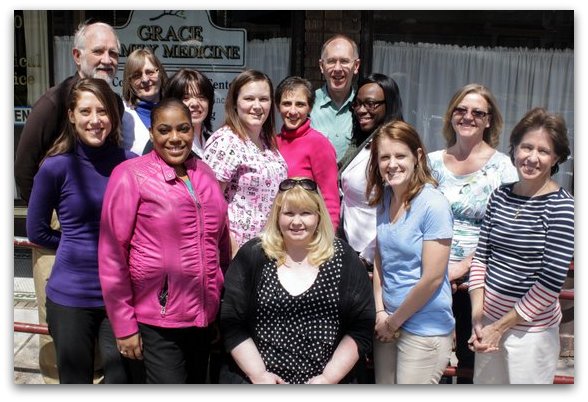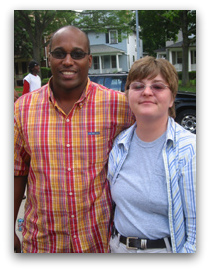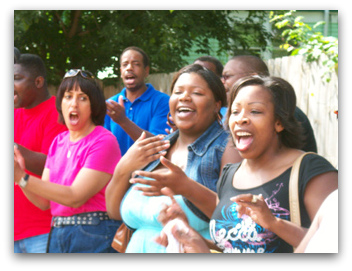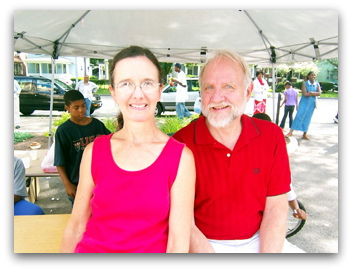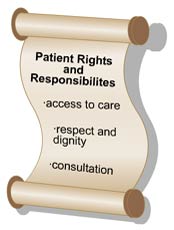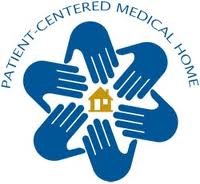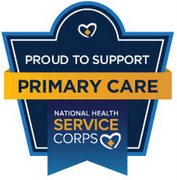1. Commitment to Christ (Ephesians 2.1-10)
As a result of experiencing Christ’s redeeming love in the midst of life’s trials and being “born anew,” all of us who have become associates of the ministry share a common faith in Jesus Christ as Lord and Savior. Moving on to develop a deep, Spirit-led commitment to follow Him in every aspect of our private and public lives, we have been called to give our lives in service to others in His Name.
Our personal commitment to Christ is nurtured through regular devotions in prayer and study of God’s Word, committed worship and fellowship in a local church, and reaching out in daily life to bear witness to God’s love in word and deed.
2. Fostering the Luke-Paul Relationship (Colossians 4.14; 2 Timothy 4.11)
One of the most mutually encouraging, edifying, and essential human relationships in the New Testament is that of the apostle Paul and his missionary traveling companion, “the beloved physician” Luke. Both wrote extensively: thirteen of Paul’s letters and two of Luke’s writings were included in the Scriptures, his Gospel and his narrative on the Acts of the Apostles which was drawn in large measure from his travels with Paul.
For centuries after the founding of the Church, the ministries of Paul (preaching and teaching) and Luke (caring for the sick and afflicted) were carried on side by side. Only in the past century or two have they become increasingly separated into “spiritual” religious ministry and “secular” medical care. We believe in rejoining these mutually compatible ministries into one integrated approach that views individuals as whole in body, soul, and spirit and sees the church and health care professions as partners.
3. Working Together in Harmony (John 17.20-23; Ephesians 4.1-7)
Along with His Branches and its staff we seek to model a form of contemporary family medical practice where believers in the Lordship of Jesus Christ can be mutually supportive in ministering professionally to the afflicted in the Name of the Lord without fear of discrimination for the full expression of their shared faith.
Three aspects of the support we offer are: celebration of our unity in the Body of Christ across denominational boundaries of doctrinal emphasis (Messianic, Pentecostal, Evangelical, Liturgical), mutual respect for each other’s personal and professional calling, and a humble assessment of our own worth as God’s associates in meeting the needs of the afflicted.
Whenever we share our faith with one another, even in questioning ways, it is for the purpose of upholding, strengthening, and learning more about God and each other. We see our work as a team effort, with Christ as the Head and each of us contributing our special gifts and skills to the whole. We are careful to value one another personally and materially, counting each one as at least as worthy if not more worthy than ourselves.
4. Loving our Neighbors (Ephesians 3.14-21)
We strive in all of our dealings with patients and the community to reflect a positive witness of the Lord Jesus, influencing those things in the lives of our patients and society which we are called to address and learning to prayerfully release those things which are beyond our control. We offer our services to as many as we are able, without discriminating against any individual or group on racial, ethnic, lifestyle or socioeconomic grounds. We have chosen to locate ourselves so that we are easily accessible to the poor.
Our aim is to spend quality time with each patient and family while honoring our commitments to patients who are waiting to be seen. Quality time means that we relate to patients as whole persons by addressing not only their physical needs but their psychological, interpersonal and spiritual concerns as well. Our goal is to draw close enough during each patient encounter that we may be able to share meaningfully with them in faith-related inquiry and prayer, seeking together with others in ministry to strengthen them in their personal faith and church participation.
We envision becoming a growing ministry, used by the Lord to meet the service needs of the community by expanding into several locally sensitive neighborhood offices which are small and personal enough to be accessible in scale as well as accountable in management.
5. Talent and Wealth (1 Chronicles 29.10-19; 1 Timothy 6.6-11)
We believe that anything we have that is of any value is an unearned gift of God’s grace, which has been entrusted to us to share with others according to His plan. We are, therefore, no more than stewards of any talent or possessions that may be at our disposal and will ultimately be judged accordingly. While recognizing that it is one of our primary responsibilities to ensure that God’s provision for our needs and those of our families comes in part through our labors, we have personally rejected any motivation to accumulate private wealth at the expense of godly service to others.
We see medical practice as an ethical profession that is, of necessity, an amalgam of both business and human service ministry. However, in our view, the ministry of medicine is primary with godly business management providing only a supportive function.
6. Advocacy for Human Life (Deuteronomy 30.19; Psalm 139.13-16)
In all of our interactions with patients and the broader community we are committed to being advocates for the protection and preservation of human life from conception to natural death, avoiding any complicity with the methods or referral to the practices of those who participate in offering abortifacient services, assisted suicide or euthanasia. Both publicly and privately we earnestly support choosing life over unsupported or unnatural death in any discussion involving beginning or end of life decisions.
7. Pro-Family Orientation (Ephesians 5.21-6.4)
We believe that God instituted the nuclear family as the basic building block of healthy, stable societies, and that faithful heterosexual marriage is the greatest protection the family has against the many attacks it is undergoing in our culture today. For these reasons, we support and respect sexual abstinence outside of marriage, faithful monogamy within marriage and legitimate parental authority.
8. The Science and Art of Medicine
We believe that Western scientific inquiry, which seeks to describe and codify the material world and discern the laws which underlie its operation, is a philosophical outgrowth of the Judeo-Christian understanding of the universe as the created work of an orderly God. Since contemporary allopathic medicine is a discipline subject to verification by the scientific method, we have a measure of confidence in its findings and therapeutic approach. We do not have the same confidence in other, alternative therapeutic disciplines based on non-scientific speculations (such as homeopathy, naturopathy, applied kinesiology, reflexology, iridology, rolfing, magnetic therapy, or chiropractic) or the philosophical or spiritual tenets of other religious and cultural systems (such as Ayurveda, Sidda, therapeutic touch, shaitsu or acupuncture).
While science may illuminate many aspects of medical diagnosis and treatment, we believe that the art of medicine remains crucial to its healing power. In this regard we place our ultimate confidence for restoring and maintaining wholeness, not in the scientific tools of our profession but in the quality of our communion with the living God and our communication with others. Through faith, prayer and study we continually seek to become more sensitive, compassionate and genuinely gifted and knowledgeable human beings who are able to relate to our patients and their problems with grace, truth and wisdom.
9. Whole Person vs. Wholistic Medicine
We believe that what has come to be called “wholistic medicine” usually amounts to augmenting or replacing traditional medical diagnosis and treatment with an eclectic assortment of alternative therapies. We also believe that the apparent efficacy of many wholistic approaches can be traced more to the quality and quantity of time spent with patients than to the particular therapies being prescribed.
The comprehensive approach we have been led to espouse, which we prefer to call “whole person medicine” or “Christ-centered family care,” complements contemporary allopathic family medical care with quality time spent in faith-related inquiry, biblically sound counseling and prayer in such a way that the physical, psychological and spiritual needs of patients are all addressed along with lifestyle issues such as interpersonal relationships, healthy nutrition, exercise, and stress management and coping strategies. As a general rule, we do not advocate unusual nutritional or mega-vitamin therapies, chelation therapy, proprietary dietary or herbal supplements or strenuous purgative regimens.
10. Community Oriented Primary Care
We believe in a broad-based focus of care that includes the neighborhoods and communities in which we and our patients live as well as those individuals and families who seek our care. We sense a particular call to underserved neighborhoods and to networking with others in the community who are assessing the resources, addressing the needs, and providing services in these areas.
11. Teaching and Research
Working together with others in the faith and medical communities, one of our primary functions as a ministry is to serve as teachers and mentors for students in the health professions who wish to pursue their careers as an expression of their Christian faith and who desire to learn how to integrate their faith with their clinical practice in seamless and practical ways. We are also committed to growing in our knowledge of Christian medical practice through ongoing study and research and sharing what we have learned wherever it may be helpful.
12. Missionary Work
We consider what we do to be home missionary work and are very supportive of those who sense a call to outreach, evangelism, and medical missions, both at home and abroad. We desire to organize ourselves so we may participate in similar missionary work in other locations as the Lord opens opportunities. In addition, we desire to remain supportive of students who have been called to the mission field after spending some of their training time with us.
Click here for a printable PDF version of these 12 Principles.


